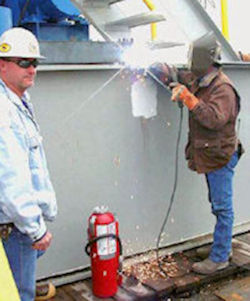Hot Work
Hot work is any work that involves burning, welding, using fire- or spark-producing tools or that produces a source of ignition. Follow these general best practices below for hot work.
- Do not perform hot work where flammable vapors or combustible materials exist.
- Relocate work and equipment outside of the hazardous areas, when possible.
- Make suitable fire-extinguishing equipment immediately available in a state of readiness. The equipment may consist of pails of water, buckets of sand, hose, or portable extinguishers dependent upon the nature and quantity of the combustible material exposed.
- When performing hot work, assign a fire watch to guard.
Fire Watch
A worker designated as the "Fire Watch" is required whenever welding or cutting is performed in locations where other than a minor fire might develop, or any of the following conditions exist:
- Appreciable combustible material, in building construction or contents, closer than 35 feet (10.7 m) to the point of operation.
- Appreciable combustibles are more than 35 feet (10.7 m) away but are easily ignited by sparks.
- Wall or floor openings within a 35-foot (10.7 m) radius expose combustible material in adjacent areas including concealed spaces in walls or floors.
- Combustible materials are adjacent to the opposite side of metal partitions, walls, ceilings, or roofs and are likely to be ignited by conduction or radiation.
Dangers of Hot Work - CSB
Fire Watch Duties
The duties of a qualified fire watch include:
- They must have fire-extinguishing equipment readily available.
- Train them on how to use fire-extinguishing equipment.
- They must be familiar with facilities for sounding an alarm in the event of fire.
- They must watch for fires in all exposed areas, try to extinguish them only when obviously within the capacity of the equipment available, or otherwise sound the alarm.
- They must maintain a fire watch for at least 30 minutes (to meet OSHA requirements) or 60 minutes (to meet NFPA requirements) after completing welding or cutting operations to detect and extinguish possible smoldering fires.
Knowledge Check Choose the best answer for the question.
2-3. What is required when hot work is performed in locations where other than a minor fire might develop?
You forgot to answer the question!

